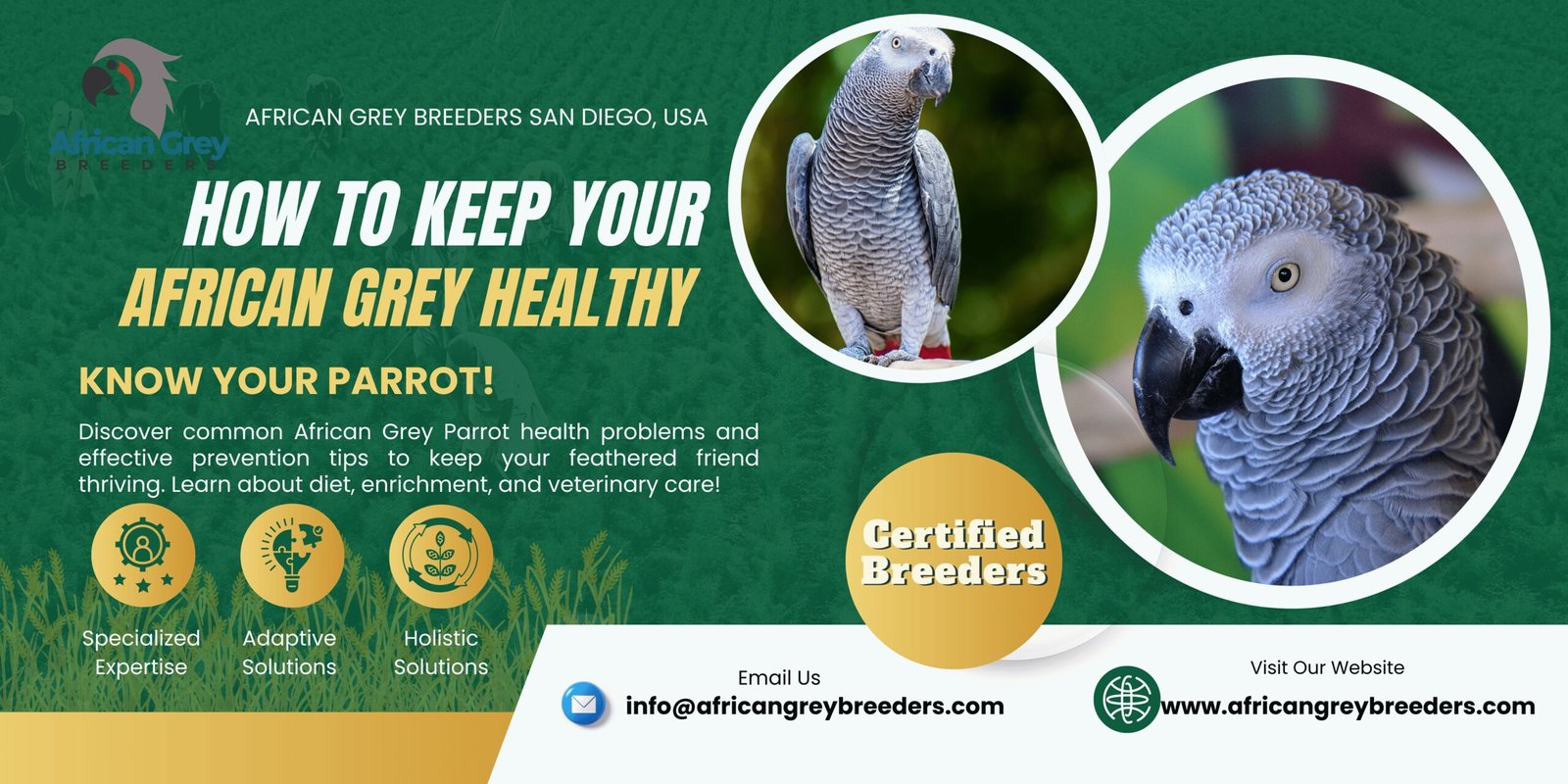African Grey Parrots are intelligent, social, and beautiful companions, but like all pets, they face specific health challenges. Understanding their unique needs is key to ensuring a long, happy life for these remarkable birds. Let’s dive into the common health issues that African Grey Parrots face and how you can prevent them.
Common African Grey Parrot Health Problems
1. Feather Plucking
Feather plucking is a common issue in African Grey Parrots, often triggered by boredom, stress, or underlying health problems. This behavior can lead to skin infections if untreated.
- Prevention Tips:
- Provide plenty of mental stimulation with toys and puzzles.
- Ensure a calm, low-stress environment.
- Offer regular out-of-cage time to promote exercise and interaction.
2. Hypocalcemia (Calcium Deficiency)
African Greys are prone to hypocalcemia, which can lead to seizures, poor feather quality, and weak bones. This condition often stems from an imbalanced diet.
- Prevention Tips:
- Feed a diet rich in calcium, including leafy greens like kale and broccoli.
- Use supplements if recommended by a veterinarian.
- Provide adequate UVB lighting to assist calcium absorption.
3. Respiratory Infections
These birds are sensitive to air quality. Dust, mold, and smoke can cause respiratory problems, leading to wheezing, sneezing, or nasal discharge.
- Prevention Tips:
- Clean their cage regularly.
- Avoid exposure to cigarette smoke, cooking fumes, or scented candles.
- Ensure proper ventilation in their living space.
4. Psittacine Beak and Feather Disease (PBFD)
PBFD is a viral disease that affects the feathers, beak, and immune system. It’s highly contagious among parrots.
- Prevention Tips:
- Quarantine new birds before introducing them to your parrot.
- Regularly disinfect cages and accessories.
- Consult your vet for regular health screenings.
5. Obesity
A diet high in seeds and low in variety can lead to obesity, reducing lifespan and causing other health issues like fatty liver disease.
- Prevention Tips:
- Provide a balanced diet with pellets, fresh vegetables, and fruits.
- Encourage physical activity by allowing them to fly or climb.
6. Vitamin A Deficiency
Vitamin A is essential for immune and respiratory health. A deficiency can result in infections, especially in the sinuses.
- Prevention Tips:
- Include foods rich in Vitamin A, like carrots, sweet potatoes, and red bell peppers.
- Rotate fresh food options to ensure nutritional variety.
How to Keep Your African Grey Healthy
A. Routine Veterinary Care
Annual check-ups with an avian veterinarian can catch potential issues early. Tests for calcium levels, PBFD, and other conditions can ensure your parrot stays in top shape.
B. Dietary Management
A diet tailored to African Grey Parrots’ needs is critical. Avoid offering only seeds; instead, opt for:
- High-quality pellets as a primary food source.
- Daily servings of vegetables and fruits (avoid avocado, which is toxic).
- Occasional nuts as treats.
C. Enrichment and Exercise
Mental and physical stimulation reduces stress and prevents behavioral issues like feather plucking. Provide climbing structures, interactive toys, and opportunities to socialize with you and other birds.
D. Cage and Living Environment
The cage should be spacious and kept clean. Place it in a quiet but interactive part of your home, ensuring natural light exposure and temperature stability.
E. Monitor Behavior and Appearance
Stay alert to changes in your parrot’s behavior, appetite, or feather quality, as these often signal underlying health concerns.
Conclusion
Caring for an African Grey Parrot requires commitment, but the rewards are immeasurable. By focusing on proper diet, mental stimulation, and regular vet care, you can ensure your feathered friend thrives for decades. Remember, prevention is always better than cure.
